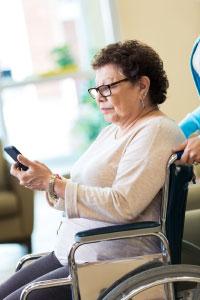
Award Recognizes, Supports Stephens’ Innovative Work on Behalf of Older Adults
In 2017, Caroline Stephens received a prestigious Paul B. Beeson Emerging Leaders Career Development Award in Aging. An associate professor of Community Health Systems at the UC San Francisco School of Nursing, Stephens will use the award to explore how technology can improve palliative care access in nursing homes and assisted living facilities around the Bay Area.
Sponsored by the National Institute on Aging (NIA), the National Institute of Neurological Disorders and Stroke, The Atlantic Philanthropies and the John A Hartford Foundation, and administered by the NIA and the American Federation for Aging Research, the Beeson award supports new investigators who are “well poised to change theory, practice and health outcomes related to the health of older individuals.” Stephens is only the second nurse-researcher to receive the award since its inception in 1995.
Experiences Inspire a Research Career
Stephens’ passion for improving care for older people is rooted in her experiences as a caregiver for her parents, both of whom developed serious chronic disease when Stephens was very young. She says, “I watched my parents get stuck in the revolving door between the ER and the nursing home with providers who didn’t understand the needs of older adults.”
She went on to earn a master’s degree in geropsychiatric advanced practice nursing and a gerontological nurse practitioner post-master’s certificate from the University of Pennsylvania School of Nursing, and then a doctoral degree in health policy from UCSF. And as she has built an impressive research career, her conversations with older adults have only increased her passion for her work.
For example, she recounts the story of a nursing home resident who died in an ambulance en route from the home to the emergency department after his wife, who could not see him in person, approved the transfer over the phone. The wife later told Stephens, “If I had been able to see what he looked like, I would have said no to the transfer and told them to keep him comfortable. I could have said goodbye.” The story is one of many that inform the project the Beeson award supports.
Striving for ImPAcTT
The project – “Improving Palliative Care Access Through Technology (ImPAcTT)” – grew out of earlier research, conducted with funding from the UCSF Clinical & Translational Science Institute, as well as the UCSF Claude D. Pepper Older Americans Independence Center and Tideswell at UCSF, in which Stephens and her co-investigators interviewed nursing home residents and staff across three Northern California facilities to evaluate the residents’ palliative care needs and challenges to meeting them. They found that, although most nursing home residents reported high symptom burden, they weren’t receiving the interdisciplinary palliative care that might have improved their quality of life. The findings were reported in a research letter published in January 2018 in JAMA Internal Medicine and discussed in a podcast on the geriatrics and palliative care blog GeriPal.
“We saw the challenges [residents and providers] were facing, and we recognized that we didn’t have the workforce to meet the needs,” Stephens says. One of the primary problems was that nursing home staff often didn’t feel they had the necessary knowledge and skills to manage the complex palliative care needs of residents, which often contributed to hospital readmissions. Clinicians who saw patients in the nursing homes and in hospital emergency departments echoed the doubts. That lack of confidence or trust, says Stephens, can lead to unnecessary transfers between nursing homes and emergency departments, which are distressing for patients and their families.
Using the Technology to Improve Care
 The ImPAcTT project team investigates ways to improve palliative care access through mobile health interventions. For ImPAcTT, Stephens has assembled a multidisciplinary team that is investigating ways to improve palliative care access in nursing homes and assisted living facilities around the Bay Area using mobile health interventions that go beyond remotely monitoring vital signs like heart rate, blood pressure and lung function. She is hopeful that the project’s findings can combat a key challenge to effective palliative care identified in Stephens’ previous work: lack of communication.
The ImPAcTT project team investigates ways to improve palliative care access through mobile health interventions. For ImPAcTT, Stephens has assembled a multidisciplinary team that is investigating ways to improve palliative care access in nursing homes and assisted living facilities around the Bay Area using mobile health interventions that go beyond remotely monitoring vital signs like heart rate, blood pressure and lung function. She is hopeful that the project’s findings can combat a key challenge to effective palliative care identified in Stephens’ previous work: lack of communication.
Far-flung families often mean that essential conversations about what kind of care best matches an individual’s end-of-life goals and values don’t happen until there’s a health crisis. “When we haven’t had those conversations about what our loved ones want, the default ends up being more care, which often isn’t ideal,” Stephens says.
Telehealth – harnessing what Stephens calls “the power of the visual” – can allow families to see what’s happening with their loved one in real-time, which can help foster more realistic expectations and facilitate honest discussions of a nursing home resident’s needs and desires.
Stephens and her co-investigators have also developed interventions that use a variety of mobile technology platforms to deliver staff education and training, family outreach, care coordination, symptom management and goals-of-care discussions, as well as timely consults with specialists for nursing home residents and families. The work is very much community-based and participatory, she says, and she and her co-investigators meet regularly with residents, families and providers and modify the interventions as needed.
Improving Care on a National Level
In addition to her work with ImPAcTT, Stephens is currently collaborating with clinicians and researchers from Alaska’s Southcentral Foundation, the Alaska Native Tribal Health Consortium and Alaskan nursing homes to look at the advanced and palliative care needs of an older population that’s largely rural and without much access to such care.
With Penny Brennan, an adjunct professor in the School’s Institute for Health & Aging, Stephens is planning to use large Medicare data sets to quantify mental health challenges nursing home residents face in the United States.
Stephens also serves as chair of the national Geropsychiatric Nursing Collaborative, and spearheaded the development and implementation of the first international interdisciplinary leadership conference on aging, dementia and mental health last summer. Supported by the National Institute on Aging and the National Hartford Center of Gerontological Nursing Excellence, the conference resulted in several white papers and commentaries published in a special supplemental issue of the Journal of the American Geriatrics Society. Stephens served as editor of the supplement and authored an editorial, “Challenges in Aging, Dementia, and Mental Health: New Knowledge and Energy to Inform Solutions.”
The conference also included an Aging, Dementia & Mental Health think tank that assembled national and international thought leaders to discuss next steps in building the science, training the next generation of scholars and clinicians and designing practice models in this field. The think tank will present its findings to key stakeholders at meetings in Boston this November, and disseminate recommendations in peer-reviewed journals.
The recognition Stephens' work has garnered is perhaps best exemplified in a new honor: next month she will be able to add “FAAN” after her name, joining a roster of elite nurse leaders and researchers as a Fellow of the American Academy of Nursing.
Stephens is grateful for the mentors who have helped her build an important career in nursing research, and she is passionate about developing the next generation of nurse-researchers. She has mentored and collaborated with a small army of doctoral students and postdoctoral fellows in gerontological nursing, who are making research contributions that Stephens hopes will foster a new round of care improvements for the country’s growing population of older adults.



